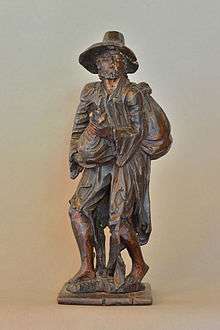Woodcarved beggars


Woodcarved Beggars originated as figures carved mostly in swiss pine, painted, or simply stained dark brown, generally from Gröden - Val Gardena in the Alps.[1]:33
In Val Gardena the carving industry began as early as at the beginning of the 17th century. The woodcarvers produced mainly statues for churches and religious figurines.[2] The production of beggars started in the late 17th century. Beggars were part of the rich production from Gröden of figurines of genre art as the figurines representing the four seasons.[3] In the baroque period (17th-18th century) the production of those figurines was very rich; Gröden counted up to 300 carvers. The woodcarving production was sold through a network of merchants originated from Gröden and residing in most of the major European cities. The last production of beggars ended beginning 19th century when the carving of wooden toys prevailed in the valley.[4]
The beggars come mostly in pairs, female and male. The female beggar carries a bag or an old musical instrument (hurdy gurdy) and the man a stolen baby and something on his back as a back basket.[1] :96–101[5]
In the antique market these figurines are often referred to as southern German although the region of origin is locatad in the former Austrian Tyrol now South Tyrol in Italy.
An important collection of these figurines is on display at the Museum Gröden in Urtijëi - Gröden. Other museums also have some of these figurines on display, like the Civic Museum in Bolzano, the Tyrolean Folk Art Museum in Innsbruck and the Bavarian National Museum in Munich.[6]
References
- 1 2 Reinhard Haller, "Volkstümliche Schnitzerei. Profane Kleinplastiken", Callwey, 1989 (German). ISBN 978-3766705891.
- ↑ Arthur Haberlandt, "Die Holzschnitzerei im Grödener Tale", Werke der Volkskunst, Band II, Heft 1. Kunst und Verlagsanstalt J. Löwy, Vienna 1914 (German) - part 2 Table 1
- ↑ Arthur Haberlandt, "Die Holzschnitzerei im Grödener Tale", Werke der Volkskunst, Band II, Heft 1. Kunst und Verlagsanstalt J. Löwy, Vienna 1914 (German) - part 2 Table II and III
- ↑ Rita Stäblein, Robert Moroder: Toy manufacture as a cottage Industry in old Gröden. Museum Gherdëina, Urtijëi, 1994.
- ↑ Arthur Haberlandt, "Die Holzschnitzerei im Grödener Tale", Werke der Volkskunst, Band II, Heft 1. Kunst und Verlagsanstalt J. Löwy, Vienna 1914 (German) - part 1
- ↑ Paolo Caneppele, "I petocchi nella scultura gardenese del 700 e 800"., Istitut Ladin San Martin de Tor, Ladinia Nr. 15, 1991 (Italian). Page 85
| Wikimedia Commons has media related to Woodcarved beggars. |